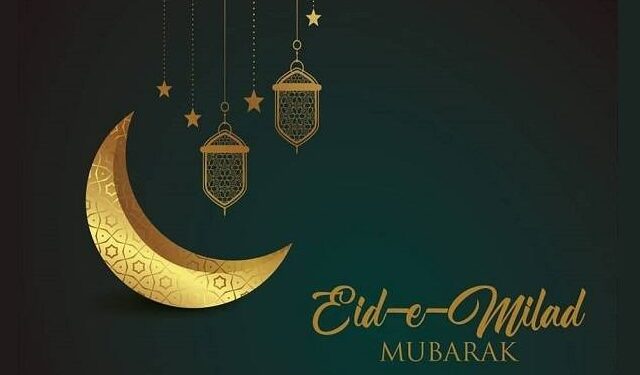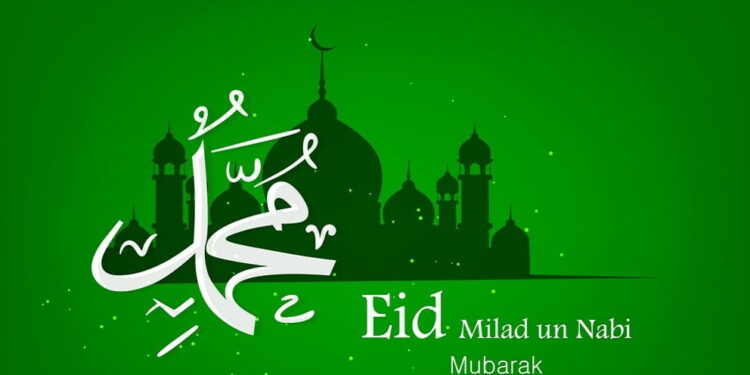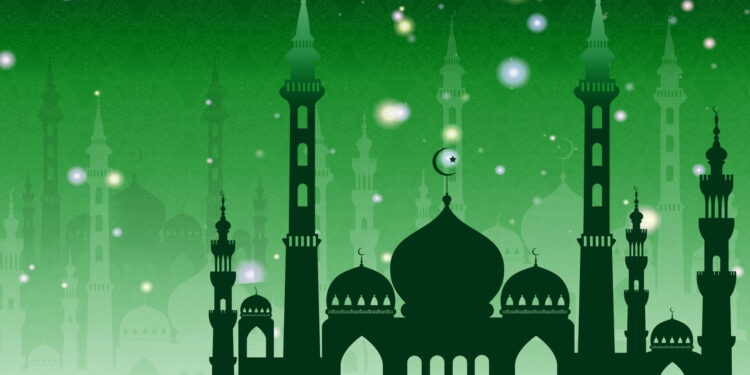Delve into the amazing world of Eid Milad-un-Nabi 2023! Celebrate Prophet Muhammad’s birth with Muslims around the globe. Adorn mosques with decorations and lights that symbolize enlightenment. Exchange greetings and offer special prayers. This year’s Eid Milad-un-Nabi is extra special. It’s a chance to follow Prophet Muhammad’s teachings of compassion, tolerance, and justice.
Remember the Battle of Ahzab in 627 CE. Prophet Muhammad bravely led the Muslim community to victory despite many adversities. Use this Eid Milad-un-Nabi 2023 to strengthen faith and embody its teachings. May it bring peace, harmony, and unity to all humankind.
Date of Eid Milad-un-Nabi 2023
Eid Milad-un-Nabi, also known as Mawlid al-Nabi, celebrates Prophet Muhammad’s birth. In 2023, it will be celebrated on 12 Rabiʻ I 1445 AH , 29th September on Friday.
This date changes yearly since it is based on the Islamic lunar calendar.
Here is the date of Eid Milad-un-Nabi in 2023:
-
Gregorian Calendar Date: 29th September
-
Islamic Lunar Calendar Date: 12 Rabiʻ I 1445 AH
-
Day of the Week: Friday
Muslims around the world gather to honor Prophet Muhammad’s life and teachings. They pray, listen to sermons, and march to spread peace and love.
It’s important to join the festivities of Eid Milad-un-Nabi. Unite with millions of people to honor Prophet Muhammad’s birth and to embrace his principles for a better world. Participate in the celebrations and feel the spiritual unity among Muslims all over the globe.
History of Eid Milad-un-Nabi

Eid Milad-un-Nabi, also known as Mawlid al-Nabi or the Prophet’s Birthday, is a special event in the Islamic calendar. It marks the birth of Prophet Muhammad and is a time to think about his lessons and life.
On this occasion, people come together in mosques and homes to pray, read the Quran, and talk about the Prophet. Although we don’t know the exact date of his birth, Eid Milad-un-Nabi is usually celebrated on the 12th day of Rabi-ul-Awwal, the third month of the Islamic calendar.
To make the event more meaningful, people may show charity by donating to good causes or help out at local organizations. By being kind and generous, like the Prophet, we can truly honor Eid Milad-un-Nabi.
In conclusion, Eid Milad-un-Nabi reminds us of the Prophet’s great influence. It’s a chance for Muslims to come together, spread love, and make the world a better place, guided by kindness and understanding.
Mawlid Un Nabi Starts facts
- Muhammad was born in Mecca to Abdullah ibn Al Muttalib, the son of the chief of the Quraysh, and Aminah bint Wahab, a member of the Banu Zuhrah tribe. His mother, Aminah, is a descendent of Abraham through his son Ismail.
- Muhammad was born on the Year of the Elephant, which is named after the year on which Aksumite king Abraha tried to destroy Mecca with an army of his elephants. Tradition dictates that the army was destroyed by birds carrying small stones, which they threw on the elephants.
- The Ottomans declared it an official holiday in 1588 and the first public celebrations included feasting, giving to the poor and reciting poetry.
- Soon after Muhammad was born, he was sent to live with Bedouins, nomadic Arabs who travel from oasis to oasis with camels. This was done because the desert life was considered healthier for infants.
- Muhammad’s father died a few months before he was born. His mother passed away when he was six years old. His grandfather, Abd al-Muttalib Shaybah ibn Hashim, became his new guardian.
Celebrations and Traditions

Streets and houses are decked out with lights, banners, and flags, creating a joyous atmosphere. People march through the streets, singing hymns and reciting prayers in colorful processions. Speeches from religious leaders about Prophet Muhammad (PBUH) are given, to encourage righteousness. As an act of charity, delicious meals are prepared and shared with family, friends, neighbors, and those in need.
Mosques also organize Quranic competitions during Eid Milad-un-Nabi to foster understanding of Islamic teachings. Muslims of all backgrounds come together in solidarity. Through these traditions, faith bonds are strengthened while conveying love, peace, and compassion.
A heartwarming story shows the importance of these festivities. During Eid Milad-un-Nabi in a small village, a boy donated his pocket money to an orphanage. His act of kindness inspired the villagers to join in and give clothes, toys, and food items. This collective effort brought much joy to the orphans and peace to the village.
Eid Milad-un-Nabi celebrates Prophet Muhammad (PBUH) and kindness towards others. These traditions remind us that humanity flourishes when we embrace compassion and strive for unity.
Read more: Eid Milad-un-Nabi 2023 Wishes Images Quotes
Global Observance
Though customs and traditions vary by country, one thing they all share is a reverence for Prophet Muhammad’s legacy. This is expressed in the Global Observance of Eid Milad-un-Nabi, a celebration of his teachings and a way to foster universal brotherhood.
The tradition of commemorating the birth of Prophet Muhammad originated in the 12th century with Sunni Muslims. Now, it is a significant part of Islamic culture in many places. It is a way to honor the Prophet’s teachings and his impact on humanity.
Controversies and Debates
When it comes to celebrating Prophet Muhammad’s birthday, there are many different viewpoints. Supporters emphasize the importance of honoring his life and teachings. Critics say there is no historical evidence for this celebration and suggest focusing on understanding his teachings instead. Others say it has become intertwined with local customs, while some fear it could lead to idolatrous tendencies.
It’s important to engage in respectful dialogue and consider different perspectives. When discussing this topic, keep an open mind and be willing to listen. Always maintain respect and courtesy towards others.
Conclusion
Wrapping up our discussion on Eid Milad-un-Nabi 2023, it’s clear that this holy day is significant for Muslims around the world. Celebrating the Prophet Muhammad’s birthday brings communities together and encourages unity and devotion.
Muslims join in activities like reading the Quran, taking part in religious processions, and doing good deeds. These activities help strengthen their faith and deepen their bond with the Prophet.
This event also focuses on spreading peace and love. Muslims attempt to show the Prophet’s teachings with harmony among their communities, and by being kind to all people, no matter their race or religion.
A tip for those celebrating Eid Milad-un-Nabi: use this time to learn more about the life and teachings of the Prophet Muhammad. Digging into his noble character and wisdom helps one understand Islam’s core principles.
Frequently Asked Questions
Q. What is Eid Milad-un-Nabi?
A. Eid Milad-un-Nabi, also known as Mawlid or Mawlid al-Nabi al-Sharif, is an Islamic holiday that commemorates the birth of Prophet Muhammad. It is celebrated in many Muslim-majority countries.
Q. When is Eid Milad-un-Nabi in 2023?
A. Eid Milad-un-Nabi in 2023 will be observed on Friday, 29th September in Pakistan.
Q. What is the history behind Eid Milad-un-Nabi?
A. Eid Milad-un-Nabi dates back to the 13th century when it was first celebrated in Egypt. The practice then spread to other parts of the Muslim world. It is considered a time to reflect on the life, teachings, and achievements of Prophet Muhammad.
Q. How is Eid Milad-un-Nabi celebrated?
A. Celebrations of Eid Milad-un-Nabi vary across different cultures and regions. It often includes recitations of poetry and hymns praising Prophet Muhammad, processions, distributing food to the needy, and gatherings where scholars may discuss the life of the Prophet.
Q. What is the significance of Eid Milad-un-Nabi?
A. Eid Milad-un-Nabi holds great spiritual significance for Muslims as it allows them to express their love and reverence for Prophet Muhammad. It provides an opportunity to learn from his teachings and serve as a reminder to follow his example of kindness, compassion, and peace.
Q. Is Eid Milad-un-Nabi a public holiday?
A. Eid Milad-un-Nabi is a public holiday in many countries with significant Muslim populations, such as Pakistan, Turkey, and India. However, its observance may vary depending on local customs and government policies.









